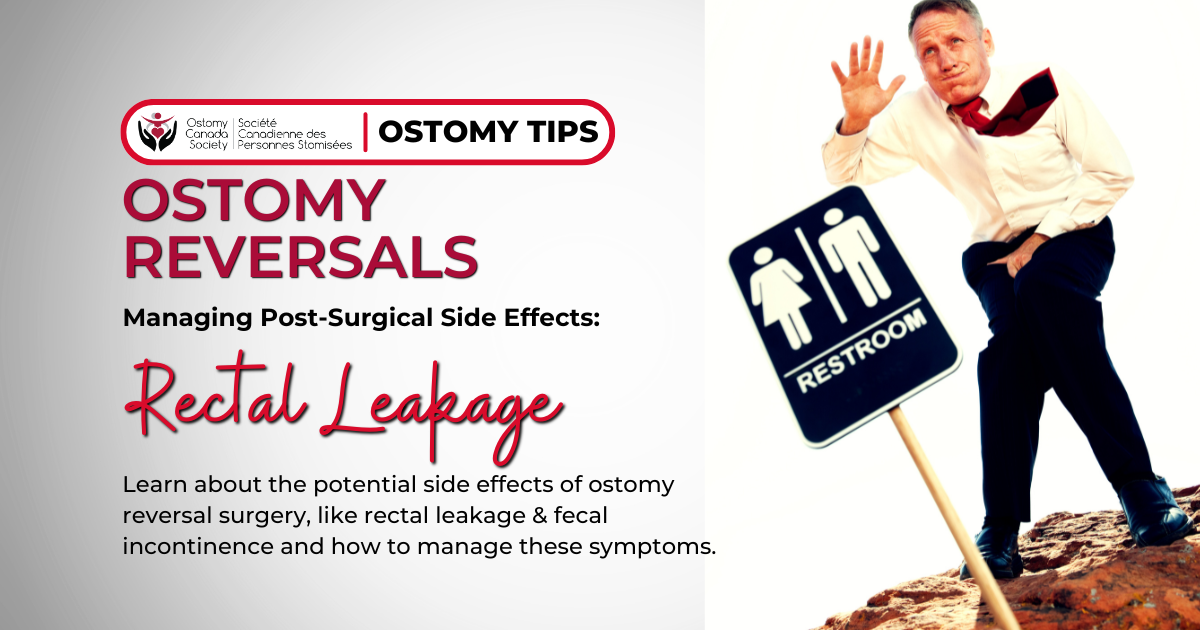Learn more about ostomy reversals and rectal leakage. Understand potential side effects of reversal surgery, such as rectal leakage and fecal incontinence, which can impact daily life. Discover how adjusting your diet, medications, and exercise can significantly help manage symptoms post-surgery. This knowledge can empower patients to make informed decisions and prepare for the recovery journey ahead.
Side Effects Of Ostomy Reversal Surgery
An ostomy reversal is elective surgery to reconnect your bowels and close your stoma. Both a colostomy and an ileostomy are reversed in the same way. After an ostomy is reversed, you may experience some common issues. One of these is rectal leakage or fecal incontinence. Other symptoms may include diarrhea, a sudden urge to use the bathroom, and pain.
How Long Does Rectal Leakage Last?
Typically, the diarrhea and increased frequency of bowel movements improve after six months or after your body has had time to retrain itself and regain control over bowel movements. Fecal incontinence is often due to weak anorectal nerves and muscles, as these weren’t being used while you had your ostomy. Your body needs time to strengthen itself. However, one study found that about a third of patients had fecal incontinence that did not improve with time. So, what can you do about it?
Diet Modifications To Manage Rectal Leakage
You can do certain things to help regulate your bowel and improve its function. One of these is dietary changes. The following suggestions include common tips you may have heard while you had your ostomy.
- Eat smaller, more frequent meals.
- Drink plenty of fluids.
- Avoid caffeine, alcohol, and fizzy drinks. These can lead to diarrhea.
- Avoid fatty or spicy dishes. These can also lead to diarrhea.
- Keep a food diary to assess how different foods affect you.
- Work with a dietician to find the optimal diet for you.
Exercises To Improve Rectal Leakage
Talk to your doctor about what exercises may be right for you. The difficulty in controlling your bowels is most often a result of weak anorectal nerves and muscles. Some common recommendations include walking and pelvic floor exercises to improve bowel function. Your doctor may connect you with a physiotherapist to guide your training and exercises.
Medications To Assist Fecal Incontinence
Talk to your medical team about the possibility of incorporating the following medical options.
- Increasing Imodium. You can take up to 16mg per day spread out throughout the day.
- Add Lomotil. This slows down transit and helps to reduce fecal output. Take it 30 minutes before meals.
- Add Codeine 15-30mg. Take it 30 minutes before meals with your other medications to help reduce diarrhea and rectal leakage. This option may not be suitable for everyone, but it works effectively if you have not responded to the above strategies.
Incorporating anti-diarrheal medications may help reduce your instances of fecal incontinence. Remember to discuss these options with your medical team to see if they are right for you.
Perianal Skin Care And Incontinence Products
Fecal incontinence can lead to skin irritation. Just like with your ostomy, keeping skincare front and center is important. After each bowel movement, use alcohol-free wet wipes designed for fecal incontinence. You can also take a quick shower and wash the skin around the anus with warm water. Pat dry with a soft cloth afterwards and apply barrier cream, such as the 3M Cavilon barrier cream. These creams are usually designed to stay on the skin after cleansing, so apply sparingly as needed. You may need to wear incontinence products like incontinence pads or special underwear. Some provincial government programs may provide funding for these products. A Nurse Specializing in Wound Ostomy and Continence (NSWOC) is a great resource.
Timing After Ostomy Reversal Surgery
When your ostomy is reversed, it can affect your functional outcome. One study found that ileostomy closure within three months of creation had lower instances of fecal incontinence than those who had their ostomies reversed after three months. While this is one guideline to consider, many factors affect when an ostomy can be closed. Having this discussion with your doctor is important as they can guide you towards the best course of action personalized to you.
Coping with Rectal Leakage
It can be difficult to cope with rectal leakage. Many people find bowel problems challenging to talk about and may experience frustration and embarrassment. Remember, you are not alone. Consider sharing your challenges with your trusted loved ones or joining an ostomy support group. Make sure to share your issues with your care team. Your medical provider has likely dealt with similar concerns and knows how to help.
Webinar: Ostomy Reversal – Reconnection & Recovery
Source
By Erika Kana, RN, Content Writer, Ostomy Canada Marketing Team.

Erika Kana is a Calgary-based Registered Nurse and health content writer. She has experience in geriatric and medical-surgical nursing and specializes in emergency nursing. Her diverse nursing experiences have sparked an interest in wound and ostomy nursing. Erika regularly seeks out ways to learn more about ostomy management and research.



